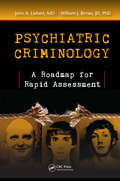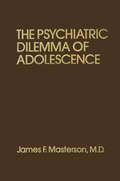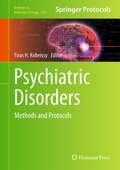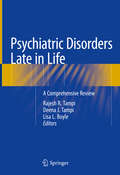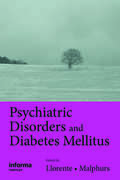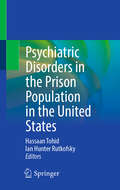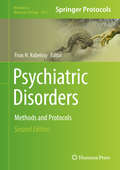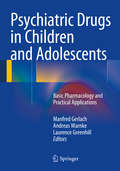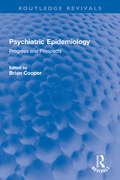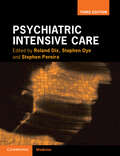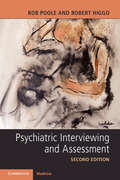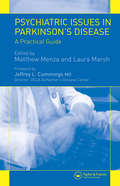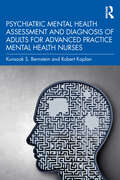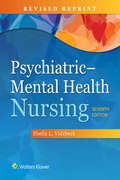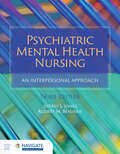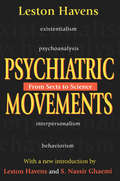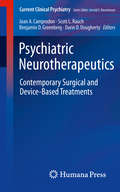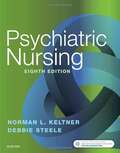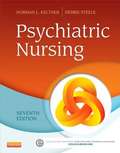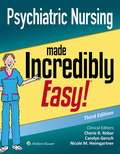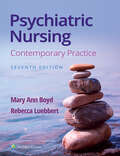- Table View
- List View
Psychiatric Criminology: A Roadmap for Rapid Assessment
by John A. Liebert, MD William J. Birnes, JD, PhDSince the shutdown of our public psychiatry system, the seriously mentally ill are now mostly managed by public safety officers, school officials, emergency first responders and social workers with little experience in recognizing symptoms, triggers and issues. This book addresses the need to recognize the psychiatric component of criminological issues and the methodology of dealing with it on a practical as well as academic basis. It provides a roadmap for training in rapid assessment built on evidence-based emergency psychiatry protocols.
Psychiatric Dilemma Of Adolescence
by James F. Masterson, M.D.This volume was first published in 1967 with an initial reissue in 1984. It is addressed to students of adolescent psychopathology in general and to students of the borderline and narcissistic personality disorders in particular. It was the first systematic research to challenge and place in perspective the then prevalent "adolescent turmoil" theory: the growth process of adolescence was producing symptoms which would subside as the patient grew older. This view had led to a tendency to deny the seriousness of psychopathology and, therefore, to postpone necessary treatment.
Psychiatric Disorders
by Firas H. KobeissyNew high throughput techniques in neuroscience and psychiatry have enhanced the development of experimental, customizable animal models that are predictive of human neuropsychiatric pathology and give vital insights on the mechanisms and pathways involved. In Psychiatric Disorders: Methods and Protocols, key experts have written integrated chapters on neuropsychiatric research sharing their insightful expertise and opinions focusing on both the animal models as well as the cutting edge techniques applied. Beginning with an overview of the animal research in psychiatric illness and substance abuse, this comprehensive volume continues with the modeling of neuropsychiatric illness, drug abuse paradigms and techniques, biomarker identification, autoimmune inflammatory response, and neuroendocrine alteration in the areas of psychiatry, as well as state-of-the-art "Omics approaches" and neurosystems biology/data mining techniques to compute and analyze genomic and proteomics alteration occurring within neuropsychiatric models. As a part of the highly successful Methods in Molecular BiologyTM series, chapters include introductions to their respective topics, lists of the necessary materials and reagents, step-by-step, readily reproducible laboratory protocols, and tips on troubleshooting and avoiding known pitfalls. Thorough and easily applicable, Psychiatric Disorders: Methods and Protocols offers the detailed and clearly illustrated tools necessary for neuroscientists and psychiatrists to handle many unanswered scientific questions with a more creative and insightful approach.
Psychiatric Disorders Late in Life: A Comprehensive Review
by Rajesh R. Tampi Deena J. Tampi Lisa L. BoyleThough mental health recommendations for the elderly is rapidly evolving, the few current textbooks on this subject are either too voluminous or complex for regular review by clinicians, and most do not contain the latest information available in the field. Written by experts in geriatric psychiatry, this book provides a comprehensive yet concise review of the subject.The text covers topics that include the social aspect of aging, treatment and diagnosis options unique to the elderly in need of psychiatric care, policy and ethics, and particular geriatric health concerns that may influence psychiatric considerations.Psychiatric Disorders Late in Life is the ultimate resource for practicing psychiatrists, physicians, geriatricians, and medical students concerned with the mental healthcare of the elderly.
Psychiatric Disorders and Diabetes Mellitus
by Maria D Llorente Julie E MalphursDiabetes mellitus is a disease that affects millions of people and their families worldwide, and is increasingly recognized to be a growing public health problem among industrialized nations. Diabetes has been associated with a variety of co-occurring conditions, including cardiovascular disease, elevated lipid serum levels, and more recently, a va
Psychiatric Disorders in the Prison Population in the United States
by Hassaan Tohid Ian Hunter RutkofskyThis book discusses why different mental disorders arise in United States prison populations, explores potential solutions, and examines prevention. The US has one of the highest rates of incarceration in the world and prisoners have disproportionally high rates of mental health concerns, which significantly affect their daily functioning and increase rates of recidivism. The first section of the book focuses on the causes and prevention of specific disorders. The disorders covered include anxiety disorders, attention-deficit/hyperactivity disorder (ADHD), schizophrenia, post-traumatic stress disorder (PTSD), and antisocial personality disorder, amongst others commonly found in the incarcerated patient population. Following the disorder-focused chapters is a chapter discussing the current state of mental health and mental health support within the US prison system. The book closes with a chapter dedicated to mental health support during the already highly challenging transition from incarceration to societal reintegration. For individuals with mental health conditions, the difficulty of this time increases exponentially, and the chapter focuses on reducing the need for and increasing the availability of mental health services. Psychiatric Disorders in the Prison Population in the United States will be of great use to mental health providers that treat current or members or former members of the US prison population.
Psychiatric Disorders: Methods and Protocols (Methods in Molecular Biology #2011)
by Firas H. KobeissyThis second edition volume expands on the previous edition with updates to chapters and new chapters discussing the latest research in neuropsychiatric diseases. The chapters in this book are organized into eleven sections and cover the diversity and utility of animal models of psychiatric disorders, their development, modelling, and pathophysiological and molecular profiles. Part One looks at experimental modeling of neuropsychiatric studies and the usefulness and need of animal models. Parts Two and Three focus on experimental models of neuropsychiatric illnesses, including self-injurious behavior, bipolar disorder, anxiety, and learning and decision-making testing. Parts Four and Five discuss animal models of substance abuse. Part Six describes protocols to examine animal models related to maladaptive eating habits and behaviors. Parts Seven and Eight cover neurodegenerative diseases stemming from natural causes (aging), abnormal genetic backgrounds, or those brought on by trauma. Part Nine talks about inflammatory and metabolic alteration profiles relevant to autism spectrum disorders and depression. Parts Ten and Eleven conclude the book with a discussion on genetics, epigenetics, and system biology in the field of psychiatric disorders. Written in the highly successful Methods in Molecular Biology series format, chapters include introductions to their respective topics, lists of the necessary materials and reagents, step-by-step, readily reproducible laboratory protocols, and tips on troubleshooting and avoiding known pitfalls.Cutting-edge and thorough, Psychiatric Disorders: Methods and Protocols, Second Edition is a useful resource for graduates, postdoctoral workers, and established scientists working in the fields of behavioral and molecular neuropsychiatric research.
Psychiatric Drugs in Children and Adolescents
by Manfred Gerlach Andreas Warnke Laurence GreenhillThis book offers a comprehensive survey of the current state of knowledge in the field of neuro-psychopharmacology in childhood and adolescence. In the first part, the essentials of neuro-psychopharmacology are presented in order to provide a deeper understanding of the principles and particularities in the pharmacotherapy of children and adolescents. This part includes information on neurotransmitters and signal transduction pathways, molecular brain structures as targets for psychiatric drugs, characteristics of psychopharmacological therapy in children and adolescents, ontogenetic influences on pharmacokinetics and pharmacodynamics, and pharmacotherapy in the outpatient setting. The part on classes of psychiatric medications, which covers antidepressants, antipsychotics, anxiolytics and sedative-hypnotics, mood stabilizers, and psychostimulants and other drugs used in the treatment of attention-deficit/hyperactivity disorder, provides sufficient background material to better understand how psychoactive drugs work, and why, when, and for whom they should be used. For each drug within a class, information on its mechanisms of action, clinical pharmacology, indications, dosages, and cognate issues are reviewed. In the third part, the disorder-specific and symptom-oriented medication is described and discerningly evaluated from a practical point of view, providing physicians with precise instructions on how to proceed. Psychiatric Drugs in Children and Adolescents includes numerous tables, figures and illustrations and offers a valuable reference work for child and adolescent psychiatrists and psychotherapists, pediatricians, general practitioners, psychologists, and nursing staff, as well as teachers.
Psychiatric Encounters: Madness and Modernity in Yucatan, Mexico (Medical Anthropology)
by Beatriz M. Reyes-FosterPsychiatric Encounters presents an intimate portrait of a public inpatient psychiatric facility in the Southeastern state of Yucatan, Mexico. The book explores the experiences of patients and psychiatrists as they navigate the challenges of public psychiatric care in Mexico. While international reports condemning conditions in Mexican psychiatric institutions abound, Psychiatric Encounters considers the large- and small-scale obstacles to quality care encountered by doctors and patients alike as they struggle to live and act like human beings under inhumane conditions. Beatriz Mireya Reyes-Foster closely examines the impact of the Mexican state’s neoliberal health reforms on how patients access care and doctors perform their duties. Engaging with madness, modernity, and identity, Psychiatric Encounters considers the enduring role of colonialism in the context of Mexico's troubled contemporary mental health care institutions.
Psychiatric Epidemiology: Progress and Prospects (Routledge Revivals)
by Brian CooperFirst published in 1987, Psychiatric Epidemiology brings together global contemporary research and data relating to psychiatric epidemiology. The book comprises edited papers from the World Psychiatric Association symposium held in Edinburgh, September 1985. Divided into six parts, it covers demographic and ecological surveys; life events, stress and social support; longitudinal and cohort studies; epidemiology and clinical issues; alcoholism and alcohol-related disorders; and epidemiology in mental health service planning. Psychiatric Epidemiology will appeal to those with an interest in the history of psychiatric epidemiology and mental health.
Psychiatric Ethics in Late-Life Patients: Medicolegal and Forensic Aspects at the Interface of Mental Health
by Aarti Gupta Meera Balasubramaniam Rajesh R. TampiThe process of aging is frequently associated with changes in the physical and mental functioning of older adults, challenging their autonomy and rendering them vulnerable to exploitation. Certain illnesses that are more common in older adults can affect their capacity to function independently. These include the capacity to make medical decisions, live independently, manage finances, to name a few. Healthcare professionals, especially psychiatrists are often entrusted with the responsibility of assessing an older adult’s capacity to perform one or more functions. This makes it imperative for them to be cognizant of these issues, understand the need for these evaluations, and be able to conduct them in a comprehensive manner. Another way of protecting an older person’s rights and facilitating a life based on their own decisions even after they lose decision making capacity is Advanced Health Care Planning (AHCP). Health care professionals are required to initiate a discussion about AHCP with their patients and their families and review it periodically. Lastly, the older adults incarcerated in prisons is a group that is growing in numbers. They have unique needs at the intersection of the geriatric and forensic services, but are often marginalized by both services. The combination of poor quality of life and increasing costs makes the care of older adults in the criminal justice system makes this topic an important public health concern. There is a pressing need for better training of prison staff in issues of geriatric psychiatry. Assessment of criminal responsibility and competence to stand trial in aging offenders are other complex but under-studied issues. This proposed book will provide a comprehensive view of ethical, medicolegal, and forensic issues that will be useful in clinical practice. There will be three sub-sections, each focusing on ethical, medicolegal and forensic issues respectively. The first section will focus on ethical issues. Its first chapters will provide an overview of the how age and the process of aging influence decision-making and introduce unique ethical dimensions to clinical care. This will be followed by a discussion of the concepts of informed consent and capacity evaluation. The next chapters will focus on common scenarios that arise in the care of elderly patients and offer a practical approach to understanding and managing them. These will include assessments of the capacity to make medical decisions, the capacity to live independently, manage finances, drive a vehicle, have sexual relations etc. A chapter on ethical issues specific to dementia will outline issues related to diagnostic disclosure and genetic testing. Research ethics issues in geriatric psychiatry will also be outlined. The next section of the book will focus on surrogate decision making in an older adult who has been deemed to lack the capacity to serve one or more functions independently. The first chapters in this sub-section will focus on patient directed advance health care planning tools, namely, living will and power of attorney. This will be followed by an overview of default surrogate making. Guardianship will subsequently be covered. A separate chapter will cover the issue of elder abuse and discuss an approach to assessing it. The last section of the book will cover forensic issues in geriatric psychiatry. The first chapter will discuss aging older adults in the criminal justice system from an epidemiological perspective. The growing numbers of incarcerated older adults, their illness burden, the challenges in the diagnosis and management of neurocognitive disorders in the prison setting will be elucidated. The following chapter will discuss competence to stand trial with reference to elderly offenders. This will be followed by a discussion of the concepts of medical reprieve, compassionate release as well as model programs and policies currently in the works for older incarcerated adults.
Psychiatric Genetics
by Frank Bellivier Marion LeboyerPsychiatric Genetics provides the reader with a complete view of the methodological problems encountered in psychiatry genetics and proposes solutions to commonly occurring questions. The best European and American specialists have given a thorough review on the advantages and disadvantages of genetic epidemiological methods, the way to choose a genetic marker or a clinical interview and how to ascertain patients, unaffected relatives and controls and what should be the criteria to include a case or a control. New phenotypic methods are described focusing on candidate symptom and endophenotype approaches. Examples coming from cognitive neurosciences, biochemistry, electrophysiology and brain imaging techniques are reviewed. This book will serve as an essential handbook for psychiatrists, psychologists, and geneticists involved in the genetics of psychiatric disorders.
Psychiatric Intensive Care
by Roland Dix Stephen Dye Stephen M. PereiraFully expanded and updated, this third edition remains an essential reference text for all healthcare professionals and managers involved in the care of the mentally ill patient, particularly in the intensive care environment. It provides practical and evidence-based advice on the management of a diverse range of disturbed and severely ill psychiatric patients in secure hospital settings. Content is focused upon some of the most challenging areas of in-patient and acute mental health practice including the PICU, the acute in-patient, and the forensic and acute mental health crisis occurring in the community. Brand-new chapters explore topics such as challenging and sexually problematic behaviour within an in-patient and other settings, and international perspectives on PICU wards. This edition also covers technological developments for improving mental health care for patients, safety for those working and living within mental health units and importantly incorporates the UK MHA Code of Practice 2015.
Psychiatric Interviewing and Assessment
by Rob Poole Robert HiggoInterviewing and assessment are integral to the practice of psychiatry, and this book helps psychiatrists and other mental health professionals develop the skills needed to gain the right information to make diagnostic formulations and build therapeutic relationships with their patients. The text examines common dilemmas and problems in an engaging and accessible way, and the use of case studies relates the principles discussed to identifiable psychiatric settings. This new edition has been revised and expanded to reflect changes in clinical practice in recent years. New chapters have been added covering the assessment of neurodevelopmental disorders, fragmented interviews and 'impossible' clinical situations such as the assessment of intoxicated patients and rhetorical interviews. Essential reading for all mental health professionals, the practical grounding in real-world clinical experience will benefit trainee psychiatrists, experienced clinicians, nurses, social workers and physician associates.
Psychiatric Interviewing: The Art Of Understanding: A Practical Guide For Psychiatrists, Psychologists, Counselors, Social Workers, Nurses, And Other Mental Health Professionals, With Online Video Modules
by Shawn Christopher SheaWith time at a premium, today's clinicians must rapidly engage their patients while gathering an imposingly large amount of critical information. These clinicians appropriately worry that the "person" beneath the diagnoses will be lost in the shuffle of time constraints, data gathering, and the creation of the electronic health record. Psychiatric Interviewing: The Art of Understanding: A Practical Guide for Psychiatrists, Psychologists, Counselors, Social Workers, Nurses, and other Mental Health Professionals, 3rd Edition tackles these problems head-on, providing flexible and practical solutions for gathering critical information while always attending to the concerns and unique needs of the patient. Over five years in the making, this classic introduction to the art of clinical interviewing returns, updated, expanded and innovatively designed for today's reader with over 7.5 hours of streaming video integrated directly into the text itself. Readers now also become viewers, acquiring the rare opportunity to see the author both illustrating specific interviewing techniques and subsequently discussing effective ways in which to employ them. The founder and Director of the acclaimed Cape Cod Symposium, Rob Guerette, describes Dr. Shea's skills as a speaker as follows, "Dr. Shea is an extremely gifted teacher, whose vibrant story-telling skills and compelling videos have led to him garnering some of the highest evaluations in the 30 year history of the Cape Cod Symposium. In short, readers are in for a rare treat when viewing the book's video component."
Psychiatric Issues in Parkinson's Disease: A Practical Guide
by Laura Marsh Matthew Menza Jeffrey L CummingsA practical guide to the management of various clinical issues seen in patients with Parkinson's Disease (PD), this text emphasizes the need for coordinated care between the various professionals, as well as between professionals and caregivers. Providing an update on current developments in the neurology and management of PD, as well as the unders
Psychiatric Mental Health Assessment and Diagnosis of Adults for Advanced Practice Mental Health Nurses
by Robert Kaplan Kunsook S. BernsteinThis text provides a comprehensive and evidence-based introduction to psychiatric mental health assessment and diagnosis in advanced nursing practice. Taking a clinical, case-based approach, this textbook is designed to support graduate nursing students who are studying psychiatric mental health nursing as they develop their reasoning and decision-making skills. It presents: Therapeutic communication and psychiatric interviewing techniques, alongside basic psychiatric terminologies. The major psychiatric diagnoses, drawing on the DSM-5. A step-by-step guide to conducting a comprehensive psychiatric mental health assessment. Case examples demonstrating assessment across major psychopathologies. Good practice for conducting mental health evaluations. This is an essential text for all those undertaking psychiatric mental health nurse practitioner programs and a valuable reference for advanced practice nurses in clinical practice.
Psychiatric Mental Health Nursing (Coursepoint Ser.)
by Sheila L. VidebeckExploring the full psychiatric nursing curriculum, this student-friendly book focuses on the skills and concepts needed for successful practice. Short concise chapters, an engaging art program, and a direct and personal approach guide students in building therapeutic communication skills within the framework of the nursing process. Access to the online video series, Lippincott Theory to Practice Video Series, provides students with an even deeper understanding of patients experiencing mental health disorders. Doody's Review Service gives this book a Weighted Numerical Score of 90 - 4 Stars! "The book is comprehensive, well written, and full of resources. The Concept Mastery Alerts in the chapters help students focus on critical content. The book is color-coded, making it easy for students to follow the format of each chapter." - Doody's Review Service
Psychiatric Mental Health Nursing: An Interpersonal Approach
by Dr. Jeffrey Jones Dr. Audrey BeauvaisPsychiatric Mental Health Nursing: An Interpersonal Approach, Third Edition is a foundational resource that weaves both the psychodynamic and neurobiological theories into the strategies for nursing interventions.
Psychiatric Movements: From Sects to Science
by Leston HavensIn the early 1970s, the preeminence of psychoanalysis in the treatment of mental illness gave way to a number of other approaches. Yet, rather than practicing in cooperation, the different schools--existentialism, psychoanalysis, interpersonalism, behaviorism--each taught its own methods, convinced it was the true psychiatry. As a result, all too frequently, varieties of psychiatry have come and gone, wallowing in a battle of sects rather than progressing toward knowledge.In Psychiatric Movements, Leston Havens posits that psychiatry must adopt a pluralistic stance, for only an inclusive psychiatry can bridge the traditional scientific quest of medicine with a humanistic interest in whole lives, inner states, and relationships with others. If for no other reason, from an ethical standpoint, the patient should get the treatment he needs, not the one treatment the doctor dispenses. This edition includes a new introduction explaining changes in the field during the last thirty years.
Psychiatric Neurotherapeutics
by Darin D. Dougherty Joan A. Camprodon Scott L. Rauch Benjamin D. GreenbergThis volume covers the gamut of surgical and device-based treatments for psychiatric disorders. Written by experts in the field, this book covers neuroscience advances in the neurobiological underpinnings of psychiatric diseases, emerging surgical and device-based treatments, and advances in the field. Topics include electroconvulsive therapy, transcranial magnetic stimulation, Vagus nerve stimulation (VNS), and many other cutting-edge treatments and techniques. Psychiatric Neurotherapeutics is a valuable resource for psychiatrists, neurosurgeons, neurologists, researchers, and all other medical professionals interested in surgical and device-based treatments of psychiatric disorders.
Psychiatric Nursing
by Norman L. Keltner Debbie SteeleCovering the field’s latest trends and treatments, Psychiatric Nursing, 8th Edition provides you with the solid, therapeutic skills you need to deliver safe and effective psychiatric nursing care. This new edition features a unique, three-pronged approach to psychotherapeutic management which emphasizes the nurse’s three primary tools: themselves and their relationship with patients, medications, and the environment. Written in a friendly, approachable style, this text clearly defines the nurse’s role in caring for individuals with psychiatric disorders like no other book on the market!
Psychiatric Nursing (Seventh Edition)
by Norman L. Keltner Debbie Steele<P>Learn the therapeutic skills you need to succeed in the nurse’s role in psychiatric care!<P> Psychiatric Nursing, 7th Edition uses a practical approach to psychotherapeutic management that clearly explains how to manage and treat individuals with psychiatric disorders.<P> It emphasizes the nurse’s three primary tools: you and your relationship with patients, medications, and the environment. <P>This edition adds a new chapter on forensics along with coverage of the latest trends and treatments.<P> Written by educators Norman Keltner and Debbie Steele, this text provides a solid, real-world foundation for the practice of safe and effective psychiatric nursing care.
Psychiatric Nursing Made Incredibly Easy! (Incredibly Easy! Series®)
by Cherie R. Rebar Carolyn J. Gersch Nicole HeimgartnerNeed an insightful, real-world guide to mental health care concepts? The newly updated Psychiatric Nursing made Incredibly Easy, 3rd Edition addresses numerous mental health nursing issues, defining disorders and management strategies and offering down-to-earth guidance on a range of care issues — all in the enjoyable Made Incredibly Easy® style. With guidance that applies to any healthcare setting, this colorfully illustrated guide walks you through the vital skills needed for psychiatric mental health nursing care, offering solid support for being exam-ready and for handling a range of mental health and substance use concerns while on the job.
Psychiatric Nursing: . Contemporary Practice
by Mary Ann Boyd Rebecca LuebbertPsychiatric Nursing: Contemporary Practice, 7th Edition, simplifies your students’ path to success in psychiatric mental health nursing, providing a comprehensive, recovery framework approach that emphasizes interventions and wellness promotion to ensure positive patient outcomes. This trusted, up-to-date text makes complex concepts easy to understand and incorporates a wealth of examples, case studies, clinical vignettes, and patient experience videos to help students confidently apply what they’ve learned in the clinical setting.
